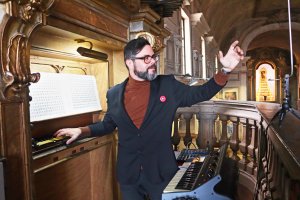Бориска Колоколa (Boriska Bells)
Бориска Колоколa (Boriska Bells) is a hommage to the russian director Andrei Tarkovsky (1932-1986). Boriska is a fictional character from the soviet biographical historical drama Andrei Rublev (1966), a young boy that starts the endeavor of building a bell. The film is loosely based on the life of Andrei Rublev, a 15th century russian Icon painter. The plot turns around for the main character when he witnesses the casting of a bell for the Grand Prince. Boriska is the son of a bellmaker that all is family died from the plague. While in death bed, his father partake the secret of casting a bronze bell. The film is deeply philosophical and moving, dealing with aspects about sin; hunger, sickness besides portraying the harsh Russian life at the time. The epilogue of the film is the only part that is shown in colour, of Icons from Andrei Rublev, cross fading in the end to four horses standing by a river in the rain. This piece is completely synchronized with this epilogue, and was a point of view, regarding composition.
Bell casting and ringing is an important part of the russian society, deeply rooted on the Orthodox Church to the point that they can be called “singing icons”. Those bells are anointed and blessed and are rather different of the European bells, even in sound with a narrower interval in the bell (a 7th instead of the usual octave) so producing a completely different harmonic content. Never the less, is the rhythm that is important, while “chiming” the bells, and not the intervals. With Boriska Bells both the harmonic and inharmonic and rhythmic changes coexist. All sound material is derived from the recording of bells, except other usual sound material that Tarkovsky continuously uses in his films; rain, thunder and water drops.
The sound transformations where done with convolution and other FFT transformations to preserve the character of the bells. A real impulse response of a church in six channels where used to spread the sound to all channels thru reverberation. The musical quotations are deeply rooted on Tarkovsky’s sound imaginary. Bach plays a great role to the director and he uses it to develop the emotion of the scene. The pipe organ chorale Ich ruf zu dir Herr Jesu from the Orgelbuchlein of Bach appears in Solaris and is quoted by other directors (Nymphomaniac, by Lars Von Trier). In the movie Offret, Tarkovsky explores the philosophical aspects, with the quote of Komm süsser Tod from Bach. So, a hommage could not be completed without the pastiche of using them appropriately.
This piece was officially chosen in the international festival MA/IN 2019, performed in Matera, Italy.
It is used by Barry Truax in the Soundscape Composition as Context-Based Creation course (Simon Fraser University).
